Psychological Safety: The New Non-Negotiable at Work

From the employee's point of view, psychological safety is about knowing it's alright to be honest and not have it all together all of the time.
From the organisation's standpoint, it's about building a culture where people feel safe to be their true self.
From either perspective, the psychological safety of Australian workplaces is firmly on the national agenda.
What Causes Disruptions to Psychological Safety?
Disruptive events, such as financial crises or a global pandemic, pull together a complex mix of anxiety, job uncertainty, money worries, workplace dynamics and relationship conflict, at times converging all at once.
These forces can be a load people silently carry at work – and the impact on productivity, mental health and workplace culture can go deep.
According to recent Medibank data, many Australians still have trouble controlling their stress levels as they continue to recover from the pandemic, with 42% reporting barely any improvement since pre-lockdown.
The Australian Government reported that the number of prescriptions filled increased when COVID-19 limits were implemented in March 2020.
The effects can linger as a low hum of stress, masked just below the surface, even as we get on with life again. With these ongoing effects of stress, building a culture where people feel safe to be themselves is crucial.
"Anxiety and mental health can be silent but deadly," shared Australian Mind Trainer Julie Robinson.
Julie works with Olympic athletes and successful businesses, so she's more equipped than most to talk about how stress affects individuals when high performance is all that matters.
How to Create Psychological Safety
"We need to start on an individual level," Julie said.
"Like putting your oxygen mask on first, you have a duty of care to yourself and then others.
"The good news is that the more an organisation is reflective and respectful, the better your employees will cope at work and in their personal life, even when a distressing event occurs," she said.
Mental health is simply a way of talking about how our minds work. They operate well under certain circumstances and perform poorly under others.
Psychological Safety Examples
"Communication is something we do countless times every day, but how can we optimise this daily task to build psychological safety with our colleagues?
"Your communication needs to be 'clean'," Julie said.
"It is easy for us all to put our penny's worth in or impose our ideas and beliefs. Yet, clean communication is a less is more way of interacting with others."
An example of clean communication is asking a colleague. 'What needs to happen to assist you?' instead of saying, 'You just need to take a holiday like I did.'
After asking a question, take some time to notice the reply, and even though there might be silence before the answer comes, you are respecting the person's processing and thinking style. Silence after someone replies with 'I don't know' also works well.
Building a psychologically safe environment starts from a foundation of empathy. It's about leading with care, compassion and curiosity. And for those organisations prioritising psychological safety, the bottom line has never looked better.
Psychological Safety Training
Learn more from Julie Robinson in MiTraining's latest online course, Supporting Employee Mental Health During Organisational Disruption. MiTraining (RTO Code 45183) is MIGAS's Registered Training Organisation, and also offers Mental Health First Aid training online and face-to-face workshops.